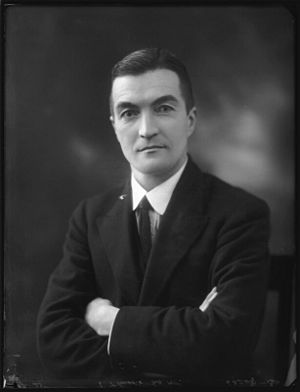Ernest Thurtle facts for kids
Quick facts for kids
Ernest Thurtle
|
|
|---|---|
 |
|
| Member of Parliament for Shoreditch and Finsbury |
|
| In office 23 February 1950 – 22 August 1954 |
|
| Preceded by | Constituency created |
| Succeeded by | Victor Collins |
| Member of Parliament for Shoreditch |
|
| In office 14 November 1935 – 23 February 1950 |
|
| Preceded by | Charles Harold Summersby |
| Succeeded by | Constituency abolished |
| In office 6 December 1923 – 27 October 1931 |
|
| Preceded by | Ernest Griffith Price |
| Succeeded by | Charles Harold Summersby |
| Personal details | |
| Born | 11 November 1884 Port Jervis, New York, U.S. |
| Died | 22 August 1954 (aged 69) Epsom, Surrey, England |
| Political party | Labour |
| Spouse |
Dorothy Lansbury
(m. 1912) |
| Children | 2 |
Ernest Thurtle (born November 11, 1884 – died August 22, 1954) was a British politician. He was a member of the Labour Party and served as a Member of Parliament (MP) for many years. He is best known for helping to change a very old military rule.
Contents
Early Life and Career
Ernest Thurtle was born in Port Jervis, New York, in the United States. Before becoming a politician, he worked as an accountant and a salesman.
He also served in the army during World War I. This was a huge global conflict that lasted from 1914 to 1918. During his time in the army, Thurtle was seriously injured at the Battle of Cambrai.
In 1912, Ernest Thurtle married Dorothy Lansbury. Her father was George Lansbury, who later became the leader of the Labour Party in the 1930s.
A Career in Parliament
Ernest Thurtle tried several times to become a Member of Parliament. He eventually succeeded and represented the area of Shoreditch, London. He was an MP for Shoreditch from 1923 to 1931 and again from 1935 to 1950.
After that, he represented Shoreditch and Finsbury from 1950 until he passed away in 1954.
Changing Military Rules
One of Ernest Thurtle's most important achievements in Parliament was helping to change a harsh military rule. In the past, British soldiers could face very severe punishments, even execution, for certain military offenses like cowardice or desertion. During World War I, over 300 British soldiers were executed for these reasons.
Thurtle believed this was wrong. He first suggested changing this rule in 1924. His idea soon became a goal for the Labour Party. In 1930, the House of Commons (one part of the British Parliament) approved the change.
However, the House of Lords (the other part of Parliament) at first did not agree. Some retired generals thought that ending these punishments would make soldiers less determined.
Australia's Example
Ernest Thurtle and his supporters had a strong argument against this idea. They pointed out that Australia, which also fought in World War I, had a different approach. Australia had made it clear from the start that none of its soldiers would be executed for such offenses.
Despite this, Australian troops were just as brave and effective as any others in the war. This showed that harsh punishments were not needed to make soldiers fight well. Because the House of Commons insisted, the new rule was finally put into law. This meant that British soldiers would no longer be executed for cowardice or desertion.
Ernest Thurtle continued to work with groups that supported former soldiers.
Other Political Roles
Beyond his work on military rules, Ernest Thurtle held several other important roles in government:
- In 1924, he was a Parliamentary Private Secretary to the Minister of Pensions. This role involves helping a government minister.
- From 1930 to 1931, he worked as a Labour whip. Whips help make sure that members of their party vote in a certain way.
- From 1941 to 1945, he was a junior minister at the Ministry of Information. This ministry was important during World War II.
Thurtle was also a journalist and wrote books. He was involved with the Rationalist Press Association, serving as its General Secretary from 1932 to 1940 and as its Chairman in 1941.
 | Leon Lynch |
 | Milton P. Webster |
 | Ferdinand Smith |

